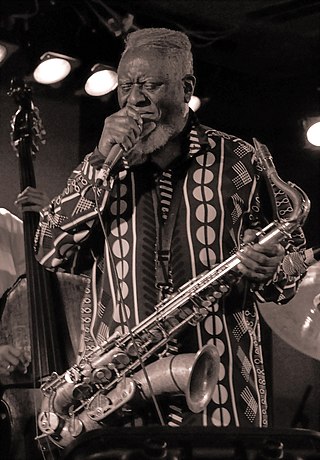
Pharoah Sanders was an American jazz saxophonist. Known for his overblowing, harmonic, and multiphonic techniques on the saxophone, as well as his use of "sheets of sound", Sanders played a prominent role in the development of free jazz and spiritual jazz through his work as a member of John Coltrane's groups in the mid-1960s, and later through his solo work. He released over thirty albums as a leader and collaborated extensively with vocalist Leon Thomas and pianist Alice Coltrane, among many others. Fellow saxophonist Ornette Coleman once described him as "probably the best tenor player in the world".
Amos Leon Thomas Jr., known professionally as Leon Thomas, was an American jazz and blues vocalist, born in East St. Louis, Illinois, and known for his bellowing glottal-stop style of free jazz singing in the late 1960s and 1970s.

Live At The Village Vanguard Again! is a live jazz album by saxophonist John Coltrane. Recorded in May 1966 during a live performance at the Village Vanguard jazz club in New York City, the album features Coltrane playing in the free jazz style that characterized his final years. The lineup features Coltrane's quintet, with Coltrane on tenor and soprano saxophones, bass clarinet, and flute, Pharoah Sanders on tenor saxophone and flute, Alice Coltrane on piano, Jimmy Garrison on bass, and Rashied Ali on drums, supplemented by Emanuel Rahim on percussion. It was the quintet's only official recording released during Coltrane's lifetime.

Love Devotion Surrender is an album released in 1973 by guitarists Carlos Santana and John McLaughlin, with the backing of their respective bands, Santana and The Mahavishnu Orchestra. The album was inspired by the teachings of Sri Chinmoy and intended as a tribute to John Coltrane. It contains two Coltrane compositions, two McLaughlin songs, and a traditional gospel song arranged by Santana and McLaughlin. It was certified Gold in 1973.

Lonnie Liston Smith Jr. is an American jazz, soul, and funk musician who played with such jazz artists as Pharoah Sanders and Miles Davis before forming Lonnie Liston Smith and the Cosmic Echoes, recording a number of albums widely regarded as classics in the fusion, smooth jazz and acid jazz genres.

Black Unity is a composition and album by jazz saxophonist Pharoah Sanders, recorded and released in late 1971. The whole album consists of a single thirty-seven-minute track, which was described by critic Joe S. Harrington as "an exercise in sustained harmonic groove that cannot be beaten" when he listed it at #38 on his Top 100 Albums. The compact disc reissue of 1997 unites the two parts as a single track, timed at 37:21.

Karma is a jazz recording by the American tenor saxophonist Pharoah Sanders, released in May 1969 on the Impulse! label, with catalog number AS 9181. A pioneering work of the spiritual jazz style, it has become Sanders' most popular and critically acclaimed album.
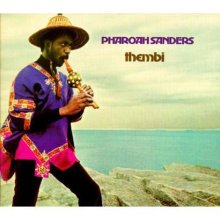
Thembi is the seventh album by free jazz saxophonist Pharoah Sanders, released in 1971.

Cosmic Music is a jazz album by John Coltrane and Alice Coltrane released after John Coltrane's death. John Coltrane only plays on two tracks, "Manifestation" and "Reverend King".

Sugar is an album by jazz saxophonist Stanley Turrentine, his first recorded for the CTI Records label following his long association with Blue Note, featuring performances by Turrentine with Freddie Hubbard, George Benson, Ron Carter, and Billy Kaye with Lonnie Liston Smith added on the title track and Butch Cornell and Richard "Pablo" Landrum on the other two tracks on the original release. The CD rerelease added a live version of the title track recorded at the Hollywood Palladium in 1971.

Tauhid is a jazz album by saxophonist Pharoah Sanders. It was the second album released under his name, and his first album on the Impulse! label. It was recorded on November 15, 1966 at Van Gelder Studio in Englewood Cliffs, NJ, four days after the concert heard on the John Coltrane album Offering: Live at Temple University, and was released in 1967, after the death of Coltrane, with whom Sanders had played since 1965. Tauhid was reissued in 2017 on Anthology Recordings. The album marks guitarist Sonny Sharrock's first appearance on a record, as well as one of pianist Dave Burrell's earliest recordings.

Jewels of Thought is an album by the American jazz saxophonist Pharoah Sanders. It was recorded at Plaza Sound Studios in New York City on October 20, 1969, and was released on Impulse! Records in the same year. The 1998 reissue merged "Sun In Aquarius" into one 27-minute-long track.

Lawrence of Newark is a jazz album by organist/keyboardist Larry Young, released on the Perception Records label.
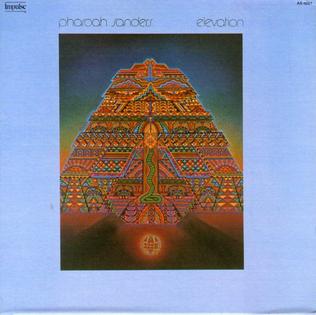
Elevation is a live album by American saxophonist and composer Pharoah Sanders, released in 1973 on the Impulse! label.

Village of the Pharoahs is the eighth album by American saxophonist and composer Pharoah Sanders, released in 1973 on the Impulse! label.

Izipho Zam is the third album led by saxophonist Pharoah Sanders recorded in 1969 but not released on the Strata-East label until 1973. It features Sanders with a large ensemble.
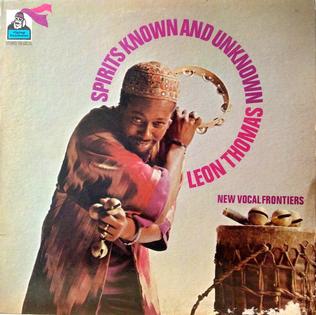
Spirits Known and Unknown, subtitled New Vocal Frontiers, is the debut album by American jazz vocalist and percussionist Leon Thomas recorded in 1969 and released by the Flying Dutchman label.

Expansions is an album by keyboardist Lonnie Liston Smith, featuring performances recorded in 1974 and released by the Flying Dutchman label the following year.
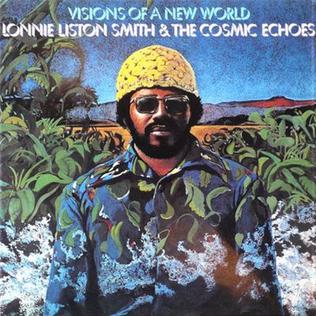
Visions of a New World is an album by keyboardist Lonnie Liston Smith, featuring performances recorded in 1975 and released by the Flying Dutchman label.

Wisdom Through Music is an album by saxophonist Pharoah Sanders. It was recorded in New York City and Los Angeles, California, and was released in 1973 by Impulse! Records. On the album, Sanders is joined by flutist James Branch, pianist Joe Bonner, bassist Cecil McBee, drummer Norman Connors, and percussionists Badal Roy, James Mtume, and Lawrence Killian. The recording was produced by Lee Young, the younger brother of saxophonist Lester Young.


















